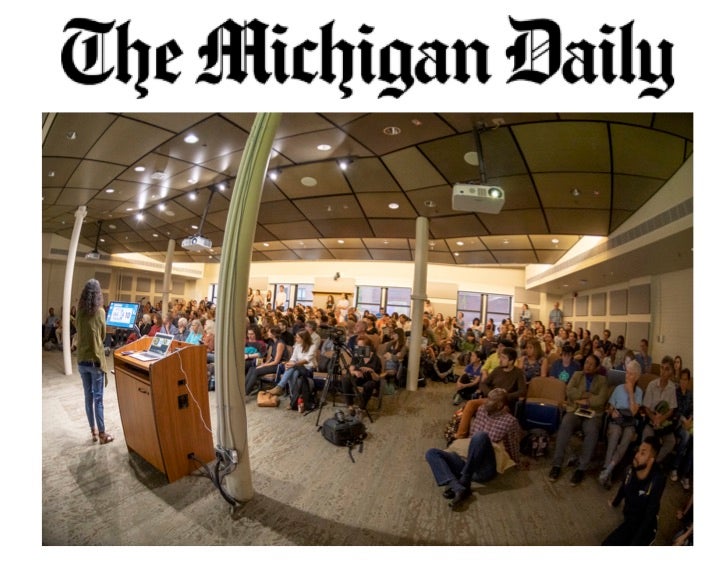Read the article on the Michigan Daily’s website here.
Tuesday, October 1, 2019 – 9:22pm
MOLLY NORRIS
Daily Staff Reporter
The University of Michigan Sustainable Food Systems Initiative held its 6th annual Fast Food For Thought event Tuesday night. Nine speakers presented on a range of topics surrounding sustainable food to over 200 students.
The speakers each had five minutes to present their topic, creating a fast-paced series of lectures. Topics ranged from childhood obesity, presented by Assistant Professor Katherine Bauer, to Professor John Vandermeer’s discussion of sustainability in Puerto Rico during the current political climate.
Students in attendance appreciated the short format of the talks. LSA junior Mark Castaneda said he felt the talk was easier to absorb than other longer, more research-heavy events.
“When you’re talking about research, it gets really hard to keep people’s attention for a long time, so having [the presentations] be five minutes is really effective,” Castaneda said.
Some other topics covered included analysis of whether meal kit services can be environmentally friendly. Program in the Environment director Shelie Miller discussed her research surrounding meal kit services, and whether the excess packaging prevents sustainability. Miller found that, though grocery stores have less packaging, using meal kits is actually more sustainable than shopping at the grocery store due to the amount of waste emitted in each scenario.
Ultimately, Miller concluded the packaging wasn’t the deciding factor. Instead, it was what was in the package that made something sustainable or not.
“It doesn’t matter how you get your food,” Miller said. “It matters what the protein is.”
Other speakers, such as School for Environment and Sustainability research fellow Martin Heller and School of Public Health research fellow Katerina Stylianou, also focused on the issue of protein. They said beef was a huge outlier when it came to food consumption’s effect on the environment.
Stylianou, who attempted to answer the question “should we all become vegan?”, found replacing beef and processed meats with more sustainable foods such as nuts and fruits could lead to a 40-percent reduction in our carbon footprint, and add 50 minutes per day to that person’s life. Heller stressed the importance of institutional change when looking at food system’s effects on the environment, pointing out altering what kind of foods universities and other large institutions serve could have a huge impact on the way food consumption affects the environment.
LSA senior Caroline Hall told The Daily she thought the event was a great way to be introduced to numerous topics surrounding food systems.
“It’s really cool how they do such short talks, so it gives you a good introduction to different concepts relating to different food systems that you’re interested in,” Hall said. “Then you can look into them in more detail later.”



